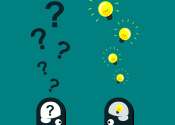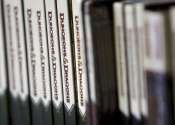Will AI kill our creativity? It could, if we don't start to value and protect the traits that make us human
There's no doubt generative AI's ability to rapidly produce new texts, images and audio is shaking up creative jobs.
Sep 28, 2023
0
1
Consumer & Gadgets

There's no doubt generative AI's ability to rapidly produce new texts, images and audio is shaking up creative jobs.
Sep 28, 2023
0
1
Business

A new report published today (20 September) from the JournalismAI initiative at the London School of Economics and Political Science (LSE) surveyed more than 100 news organizations from 46 countries about their engagement ...
Sep 20, 2023
0
2
Machine learning & AI

Large language model (LLM) AI chatbots may be able to outperform the average human at a creative thinking task where the participant devises alternative uses for everyday objects (an example of divergent thinking), suggests ...
Sep 14, 2023
0
86
Machine learning & AI

Of all the forms of human intellect that one might expect artificial intelligence to emulate, few people would likely place creativity at the top of their list. Creativity is wonderfully mysterious—and frustratingly fleeting. ...
Aug 25, 2023
1
183
Machine learning & AI

The Dungeons & Dragons role-playing game franchise says it won't allow artists to use artificial intelligence technology to draw its cast of sorcerers, druids and other characters and scenery.
Aug 7, 2023
2
31
Internet

TikTok, the social platform known for its addictive video content, announced Monday that it will offer text-only posts, becoming the latest tech giant to offer an alternative to embattled Twitter.
Jul 24, 2023
0
13
Computer Sciences

When I asked ChatGPT for a joke about Sicilians the other day, it implied that Sicilians are stinky.
Jul 20, 2023
0
18
Computer Sciences

New research from the University of Montana and its partners suggests artificial intelligence can match the top 1% of human thinkers on a standard test for creativity.
Jul 5, 2023
0
755
Computer Sciences

Making art using artificial intelligence isn't new. It's as old as AI itself.
Jun 23, 2023
1
20
Consumer & Gadgets

In 2022, an AI-generated work of art won the Colorado State Fair's art competition. The artist, Jason Allen, had used Midjourney—a generative AI system trained on art scraped from the internet—to create the piece. The ...
Jun 16, 2023
1
62
Creativity refers to the phenomenon whereby a person creates something new (a product, a solution, a work of art, a novel, a joke, etc.) that has some kind of value. What counts as "new" may be in reference to the individual creator, or to the society or domain within which the novelty occurs. What counts as "valuable" is similarly defined in a variety of ways.
Scholarly interest in creativity ranges widely: Topics to which it is relevant include the relationship between creativity and general intelligence; the mental and neurological processes associated with creative activity; the relationship between personality type and creative ability; the relationship between creativity and mental health; the potential for fostering creativity through education and training, especially as augmented by technology; and the application of an individual's existing creative resources to improve the effectiveness of learning processes and of the teaching processes tailored to them.
Creativity and creative acts are therefore studied across several disciplines - psychology, cognitive science, education, philosophy (particularly philosophy of science), technology, theology, sociology, linguistics, business studies, and economics. As a result, there are a multitude of definitions and approaches.
This text uses material from Wikipedia, licensed under CC BY-SA